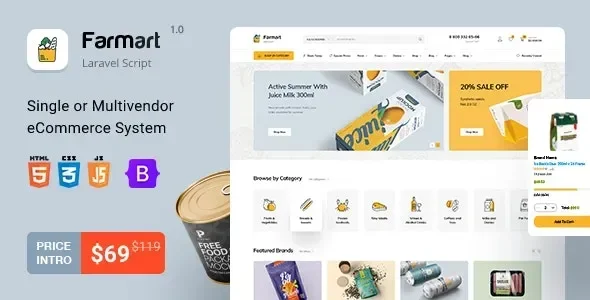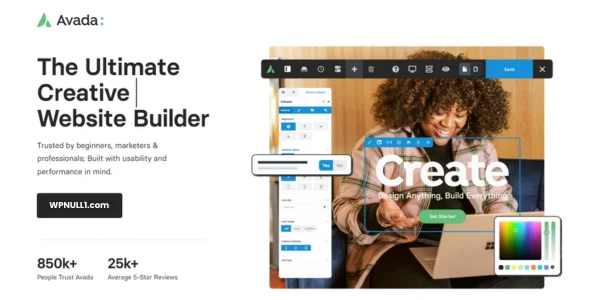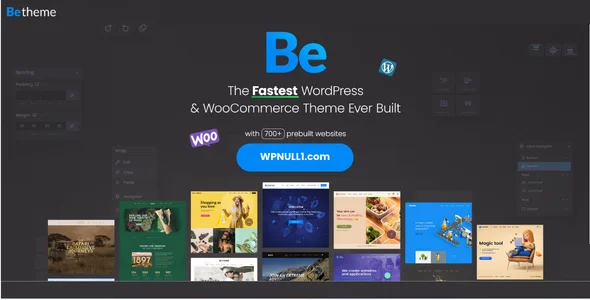Farmart Single or Multivendor Laravel eCommerce System Free Download is built on the Laravel framework, known for its performance and scalability. Offering a rich array of features and customization options, Farmart is engineered to support eCommerce businesses of all sizes, from startup boutiques to large-scale online marketplaces. Whether you’re launching a single vendor online shop or a comprehensive multivendor marketplace, Farmart provides the tools necessary for managing products, vendors, and customer interactions efficiently.
Main Features
Versatile eCommerce Capabilities
Farmart shines in its ability to host both single vendor and multivendor setups, making it a versatile choice for a variety of business models. Users can seamlessly transition from a single vendor shop to a multivendor marketplace as their business grows, without the need for migrating to a different platform.
Comprehensive Vendor Management
For multivendor operations, Farmart offers extensive vendor management tools. Vendors can manage their inventory, set up unique storefronts, and track sales with ease. The system includes features for splitting payments, managing commissions, and providing detailed analytics to both vendors and the site administrator.
High Customizability and Scalability
Built on the Laravel framework, Farmart is highly customizable and scalable. It can handle high volumes of traffic and transactions with ease, ensuring that your eCommerce site remains fast and reliable as it grows. Additionally, its modular nature allows for extensive customization to meet specific business needs or customer demands.
Who is Farmart Ideal For?
Emerging Startups
Startup businesses planning to enter the eCommerce space can benefit greatly from Farmart’s single vendor setup. It provides a solid foundation with all necessary eCommerce functionalities, combined with the potential to scale to a multivendor marketplace in the future.
Established Multivendor Marketplaces
Businesses looking to either start or migrate an existing multivendor marketplace will find Farmart’s robust multivendor features tailored to their needs. The platform’s tools for managing multiple vendors and transactions make it ideal for large-scale operations.
Entrepreneurs in Niche Markets
Entrepreneurs focusing on niche markets can utilize Farmart to set up specialized marketplaces with multiple independent vendors. Its flexibility allows for the creation of a tailored shopping experience that caters to specific consumer interests or industries.
Pros and Cons
Pros
- Flexibility: Supports both single vendor and multivendor setups under one system.
- Scalability: Built to handle large volumes of users and transactions without compromising performance.
- Customization: Offers significant customization capabilities thanks to its Laravel foundation.
Cons
- Technical Requirement: Requires a good understanding of Laravel and web development to fully exploit its customization features.
- Resource Intensity: Being a robust system, it may require more server resources, which could increase operational costs.
- Complexity: The wide array of features and options might be overwhelming for beginners or small businesses without technical support.
Comparison with Popular Alternatives
To provide context on how Farmart stands against the competition, let’s examine it alongside four popular eCommerce platforms:
1. Magento
- Features: Known for its robust functionality and flexibility.
- Pros: Highly customizable and scalable, suitable for large enterprises.
- Cons: Complex and resource-intensive, requiring significant development skills and maintenance.
2. Shopify
- Features: A user-friendly hosted eCommerce solution.
- Pros: Easy to set up and use, with a wide range of themes and plugins.
- Cons: Less customizable than Laravel-based solutions like Farmart, with higher ongoing costs due to monthly fees and add-ons.
3. WooCommerce
- Features: A popular WordPress plugin that turns a site into an eCommerce store.
- Pros: Easy integration with WordPress, extensive plugin ecosystem.
- Cons: Can become cumbersome as the store grows, and might not scale as smoothly as a dedicated system like Farmart.
4. OpenCart
- Features: An open-source online store management system.
- Pros: Free and easy to use, with decent functionality for small to medium-sized shops.
- Cons: Lacks the robustness and scalability required for larger or rapidly growing multivendor marketplaces.
The Farmart Single or Multivendor Laravel eCommerce System Nulled is an excellent choice for those seeking a flexible, powerful, and scalable eCommerce solution. Whether starting from scratch or scaling up an existing business, Farmart provides the tools necessary for growth and success in the digital marketplace. While it does require a certain level of technical expertise, the investment in developing and maintaining a Farmart-based store can pay significant dividends in terms of performance, customization, and overall user satisfaction. For businesses ready to take their online presence to the next level, Farmart offers a comprehensive platform that grows with your needs.
Changelog
Version 1.22.2 – Sep 18, 2024
- Fix SAME PRICE discount issue
- Fix missing translations in email templates
- Ignore case-sensitive when importing products
- Improve orders export, add missing customer phone number
- Add Stripe Marketplace Connect: https://stripe.com/docs/connect (activate it in Plugins -> Installed plugins)
- Add store square logo (it will be used in some special places, such as: checkout page)
- Add product specification (enable it in Settings -> Products)
- Add option to disable coupon when product is in flash sale
- Add option to convert image to WebP when uploading to Admin -> Media
- Add setting to change logo height in email template
- Add option to set admin logo max height
- Send confirmation email when someone submit contact form
- Improve cache for better performance
- Optimize source code
- Update third-party libraries to the latest versionVersion 1.22.1 – Aug 27, 2024
- Fix product categories dropdown URL issue
- Add search box for category tree field
- Add missing translations
- Add product specification tab (enable it in Settings -> Products)
- Add option to disable vendor registration form at registration page
- Add option to change product quantity at the checkout page
- Add order delivered confirmation in customer dashboard
- Add merchant return policy URL in theme options
- Improve product filters
- Improve cache for better performance
- Optimize source code
- Update third-party libraries to the latest version
Version 1.22.0 – Aug 06, 2024
- Fix wishlist issue
- Fix missing translations & icon in vendor rejected email
- Fix multi-language for store settings
- Add option to disable vendor document verification
- Add store name on coupon if it's created by a vendor
- Add option to set default country at the checkout page
- Add option to make phone number required during registration
- Add Backblaze cloud storage support
- Add more social login button styles
- Add option to disable thumbnails generation when uploading images
- Improve tax by countries
- Improve product bulk update price
- Improve cache for better performance
- Optimize source code
- Update third-party libraries to the latest version
Version 1.21.8 – Jul 25, 2024
- Fix missing custom fields in contact email
- Add import/export product categories
- Add payout invoice
- Add option to chang thumbnail crop position
- Add option to hide media files for other users
- Improve image field, add option to use external image URL instead of downloading to local storage
- Improve social login UI
- Improve core





